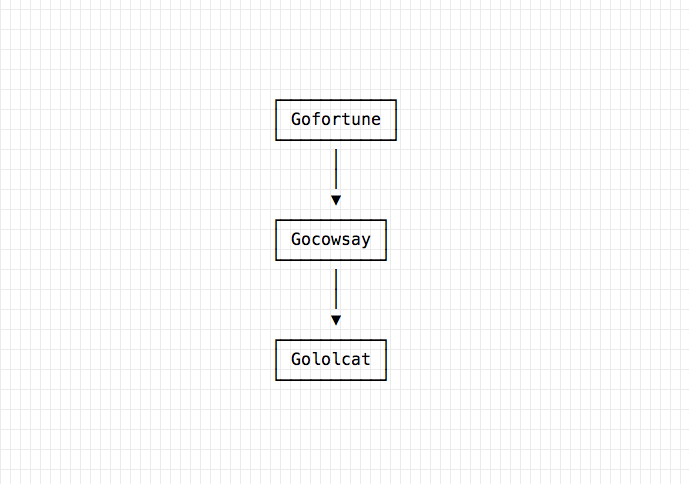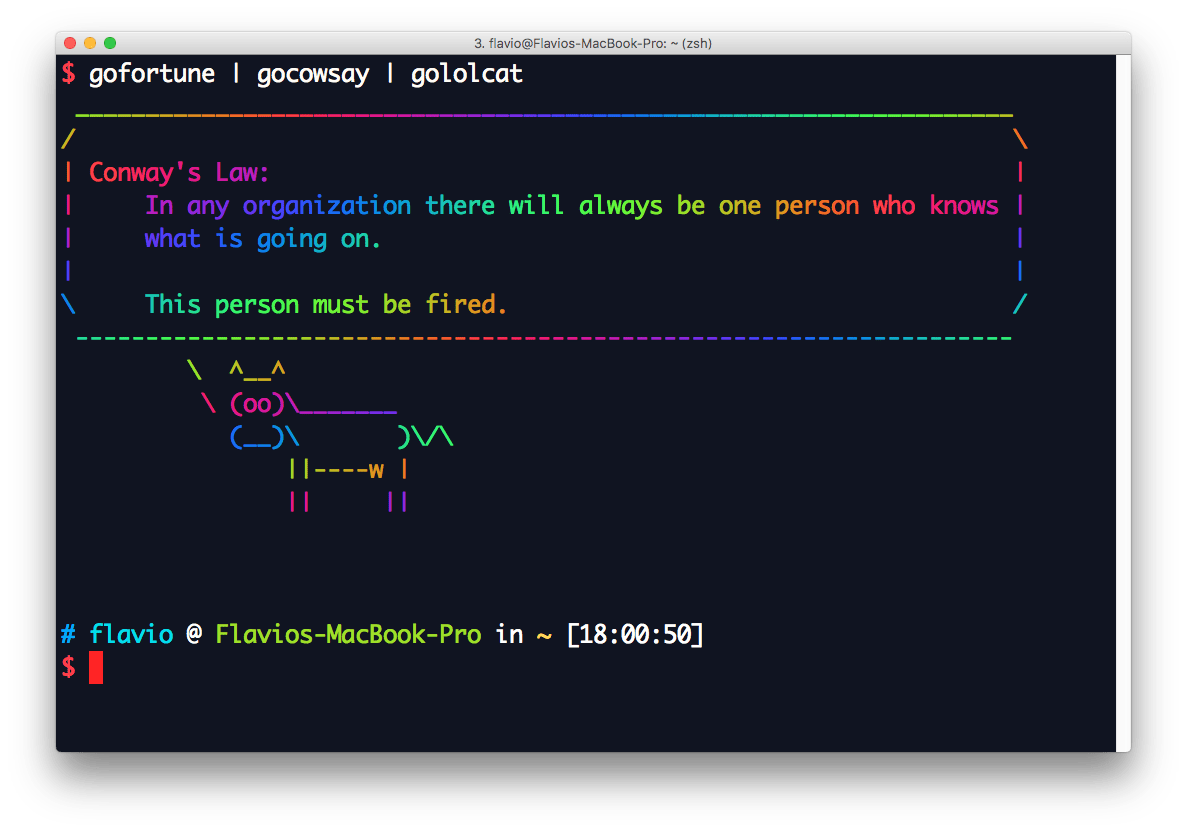Go CLI tutorial: fortune clone
I’ve written two CLI app tutorials to build gololcat and gocowsay. In both I used fortune as the input generator.
In this article, I’ll complete the pipe triology with gofortune.

What is fortune, first? As Wikipedia says, Fortune is a simple program that display a pseudorandom message from a database of quotations.
Basically, a random quote generator.
It has a very long history dating back to Unix Version 7 (1979). It’s still going strong. Many Linux distributions preinstall it, and on OSX you can install it using brew install fortune.
On some systems, it’s used as a greeting or parting message when using shells.
Wikipedia also says
Many people choose to pipe fortune into the cowsay command, to add more humor to the dialog.
That’s me! Except I use my gocowsay command.
Enough with the intro, let’s build a fortune clone with Go.
Here’s a breakdown of what our program will do.

The fortunes folder location depends on the system and distribution, being a build flag. I could hardcode it or use an environment variable but as an exercise, I’ll do a dirty thing and ask fortune directly, by executing it with the -f flag, which outputs:

The first line of the output contains the path of the fortunes folder.
package main
import (
"fmt"
"os/exec"
)
func main() {
out, err := exec.Command("fortune", "-f").CombinedOutput()
if err != nil {
panic(err)
}
fmt.Println(string(out))
}This snippet replicates the output exactly as I got it.
It seems that fortune -f writes the output to stderr, that’s why I used CombinedOutput, to get both stdout and stderr.
But, I just want the first line. How to do it? This prints all the output of stderr line-by-line:
package main
import (
"bufio"
"fmt"
"os/exec"
)
func main() {
fortuneCommand := exec.Command("fortune", "-f")
pipe, err := fortuneCommand.StderrPipe()
if err != nil {
panic(err)
}
for outputStream.Scan() {
fmt.Println(outputStream.Text())
}
}To get just the first line, I remove the for loop, and just scan the first line:
package main
import (
"bufio"
"fmt"
"os/exec"
)
func main() {
fortuneCommand := exec.Command("fortune", "-f")
pipe, err := fortuneCommand.StderrPipe()
if err != nil {
panic(err)
}
fortuneCommand.Start()
outputStream := bufio.NewScanner(pipe)
outputStream.Scan()
fmt.Println(outputStream.Text())
}
Now let’s pick that line and extract the path.
On my system the first line of the output is 100.00% /usr/local/Cellar/fortune/9708/share/games/fortunes. Let’s make a substring starting from the first occurrence of the / char:
line := outputStream.Text()
path := line[strings.Index(line, "/"):]Now I have the path of the fortunes. I can index the files found in there. There are .dat binary files, and plain text files. I’m going to discard the binary files, and the off/ folder altogether, which contains offensive fortunes.
Let’s first index the files. I use the path/filepath package Walk method to iterate the file tree starting from root. I use it instead of ioutil.ReadDir() because we might have nested folders of fortunes. In the WalkFunc visit I discard .dat files using filepath.Ext(), I discard the folder files (e.g. /off, but not the files in subfolders) and all the offensive fortunes, conveniently located under /off, and I print the value of each remaining file.
func visit(path string, f os.FileInfo, err error) error {
if strings.Contains(path, "/off/") {
return nil
}
if filepath.Ext(path) == ".dat" {
return nil
}
if f.IsDir() {
return nil
}
files = append(files, path)
return nil
}
func main() {
fortuneCommand := exec.Command("fortune", "-f")
pipe, err := fortuneCommand.StderrPipe()
if err != nil {
panic(err)
}
fortuneCommand.Start()
outputStream := bufio.NewScanner(pipe)
outputStream.Scan()
line := outputStream.Text()
root := line[strings.Index(line, "/"):]
err = filepath.Walk(root, visit)
if err != nil {
panic(err)
}
}Let’s put those values in a slice, so I can later pick a random one: I define a files slice of strings and I append to that in the visit() function. At the end of main() I print the number of files I got.
package main
import (
"bufio"
"log"
"os"
"os/exec"
"path/filepath"
"strings"
)
var files []string
func visit(path string, f os.FileInfo, err error) error {
if err != nil {
log.Fatal(err)
}
if strings.Contains(path, "/off/") {
return nil
}
if filepath.Ext(path) == ".dat" {
return nil
}
if f.IsDir() {
return nil
}
files = append(files, path)
return nil
}
func main() {
fortuneCommand := exec.Command("fortune", "-f")
pipe, err := fortuneCommand.StderrPipe()
if err != nil {
panic(err)
}
fortuneCommand.Start()
outputStream := bufio.NewScanner(pipe)
outputStream.Scan()
line := outputStream.Text()
root := line[strings.Index(line, "/"):]
err = filepath.Walk(root, visit)
if err != nil {
panic(err)
}
println(len(files))
}I now use the Go random number generator functionality to pick a random item from the array:
// Returns an int >= min, < max
func randomInt(min, max int) int {
return min + rand.Intn(max-min)
}
func main() {
//...
rand.Seed(time.Now().UnixNano())
i := randomInt(1, len(files))
randomFile := files[i]
println(randomFile)
}Our program now prints a random fortune filename on every run.
What I miss now is scanning the fortunes in a file, and printing a random one. In each file, quotes are separated by a % sitting on a line on its own. I can easily detect this pattern and scan every quote in an array:
file, err := os.Open(randomFile)
if err != nil {
panic(err)
}
defer file.Close()
b, err := ioutil.ReadAll(file)
if err != nil {
panic(err)
}
quotes := string(b)
quotesSlice := strings.Split(quotes, "%")
j := randomInt(1, len(quotesSlice))
fmt.Print(quotesSlice[j])This is not really efficient, as I’m scanning the entire fortune file in a slice and then I pick a random item, but it works:

So, here’s the final version of our very basic fortune clone. It misses a lot of the original fortune command, but it’s a start.
package main
import (
"bufio"
"fmt"
"io/ioutil"
"log"
"math/rand"
"os"
"os/exec"
"path/filepath"
"strings"
"time"
)
var files []string
// Returns an int >= min, < max
func randomInt(min, max int) int {
return min + rand.Intn(max-min)
}
func visit(path string, f os.FileInfo, err error) error {
if err != nil {
log.Fatal(err)
}
if strings.Contains(path, "/off/") {
return nil
}
if filepath.Ext(path) == ".dat" {
return nil
}
if f.IsDir() {
return nil
}
files = append(files, path)
return nil
}
func main() {
fortuneCommand := exec.Command("fortune", "-f")
pipe, err := fortuneCommand.StderrPipe()
if err != nil {
panic(err)
}
fortuneCommand.Start()
outputStream := bufio.NewScanner(pipe)
outputStream.Scan()
line := outputStream.Text()
root := line[strings.Index(line, "/"):]
err = filepath.Walk(root, visit)
if err != nil {
panic(err)
}
rand.Seed(time.Now().UnixNano())
i := randomInt(1, len(files))
randomFile := files[i]
file, err := os.Open(randomFile)
if err != nil {
panic(err)
}
defer file.Close()
b, err := ioutil.ReadAll(file)
if err != nil {
panic(err)
}
quotes := string(b)
quotesSlice := strings.Split(quotes, "%")
j := randomInt(1, len(quotesSlice))
fmt.Print(quotesSlice[j])
}Wrapping up, I move visit as an inline function argument of filepath.Walk and move files to be a local variable inside main() instead of a global file variable:
package main
import (
"bufio"
"fmt"
"io/ioutil"
"log"
"math/rand"
"os"
"os/exec"
"path/filepath"
"strings"
"time"
)
// Returns an int >= min, < max
func randomInt(min, max int) int {
return min + rand.Intn(max-min)
}
func main() {
var files []string
fortuneCommand := exec.Command("fortune", "-f")
pipe, err := fortuneCommand.StderrPipe()
if err != nil {
panic(err)
}
fortuneCommand.Start()
outputStream := bufio.NewScanner(pipe)
outputStream.Scan()
line := outputStream.Text()
root := line[strings.Index(line, "/"):]
err = filepath.Walk(root, func(path string, f os.FileInfo, err error) error {
if err != nil {
log.Fatal(err)
}
if strings.Contains(path, "/off/") {
return nil
}
if filepath.Ext(path) == ".dat" {
return nil
}
if f.IsDir() {
return nil
}
files = append(files, path)
return nil
})
if err != nil {
panic(err)
}
rand.Seed(time.Now().UnixNano())
i := randomInt(1, len(files))
randomFile := files[i]
file, err := os.Open(randomFile)
if err != nil {
panic(err)
}
defer file.Close()
b, err := ioutil.ReadAll(file)
if err != nil {
panic(err)
}
quotes := string(b)
quotesSlice := strings.Split(quotes, "%")
j := randomInt(1, len(quotesSlice))
fmt.Print(quotesSlice[j])
}I can now go build; go install and the triology gofortune gocowsay and gololcat is completed:

download all my books for free
- javascript handbook
- typescript handbook
- css handbook
- node.js handbook
- astro handbook
- html handbook
- next.js pages router handbook
- alpine.js handbook
- htmx handbook
- react handbook
- sql handbook
- git cheat sheet
- laravel handbook
- express handbook
- swift handbook
- go handbook
- php handbook
- python handbook
- cli handbook
- c handbook
subscribe to my newsletter to get them
Terms: by subscribing to the newsletter you agree the following terms and conditions and privacy policy. The aim of the newsletter is to keep you up to date about new tutorials, new book releases or courses organized by Flavio. If you wish to unsubscribe from the newsletter, you can click the unsubscribe link that's present at the bottom of each email, anytime. I will not communicate/spread/publish or otherwise give away your address. Your email address is the only personal information collected, and it's only collected for the primary purpose of keeping you informed through the newsletter. It's stored in a secure server based in the EU. You can contact Flavio by emailing flavio@flaviocopes.com. These terms and conditions are governed by the laws in force in Italy and you unconditionally submit to the jurisdiction of the courts of Italy.